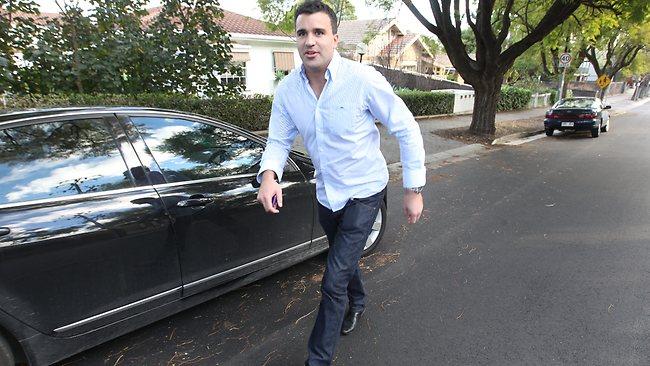The audacious king makers in Labor's power struggle
IT is the image of 30-year-old union boss Peter Malinauskas knocking on the door of Premier Mike Rann that strikes many as a sign of the audacious power of the state's shoppies' union.

IT is the image of union boss Peter Malinauskas knocking on the door of Premier Mike Rann that strikes many as a sign of the audacious power of the state's shoppies' union.
IT is the image of 30-year-old union boss Peter Malinauskas knocking on the door of veteran Premier Mike Rann that strikes many as a sign of the audacious power of the state's shoppies' union.
Revelations of Friday's confrontation between Mr Malinauskas, Treasurer Jack Snelling and Premier Rann has focused the public's attention on the powerbrokers behind the party.
The factional deal attempting to elevate a Left-aligned minister to premier could not have happened without the powerful Right faction, controlled by the Shop, Distributive and Allied Employees Association.
While the move is a common-sense decision driven by popularity stakes, the Liberal Party has sharpened its attack on Labor's "faceless men" behind the deal.
"Labor powerbrokers and its faceless unionists have put self-interest before the interests of South Australia," Opposition Leader Isobel Redmond said.
Deputy Premier John Rau yesterday revealed it was Mr Malinauskas who delivered him the news he didn't have the Right's backing to be Premier.
Mr Rau said Mr Malinauskas informed him "some time in the afternoon" last Friday, but could not say if this was before the meeting with Mr Rann, in which Mr Rann is alleged to have threatened to "unleash World War III".
Health Minister John Hill said the Liberal Party's attack on Labor's handling of leadership was "like taking advice from Paris Hilton on chastity".
"What those gentlemen were doing was informing the current premier that they've now reached a consensus about where that was going to go," he said.
The leadership coup, which is teetering on chaos, has again highlighted the role of Labor's factions in determining leaders.
Past Labor leaders who have met similar fates in office include not only Kevin Rudd but Bob Hawke, NSW premiers Morris Iemma and Nathan Rees and WA premier Peter Dowding.
Mike Rann's ignoble cease-and-desist notice has reminded the public the Labor Party always has its eye on the prize of elections - the reason for its extraordinary discipline.
"The Labor Party is bigger than anyone of us that has served in it," Infrastructure Minister Patrick Conlon said this week.
Former NSW premier Bob Carr, who served 10 years in office like Mr Rann, said it was disappointing the "nervous" factions had ground prematurely into gear.
"What advantage South Australian Labor will get from forcing the pace of Mike Rann's resignation is yet to be explained or seen," Mr Carr said.
Labor's discipline stems from its formal factionalisation, which occurred in the 1980s, as a way to control the ideological differences that had ravaged the party and kept it out of office.
It is divided into two main factions, based around two exceptionally powerful unions.
The Right is dominated by the SDA, while the Left is linked to the Liquor, Hospitality and Miscellaneous Union (LHMU), known as the "Missos". Labor's factions determine who is preselected in certain seats, and who is assigned ministries.
The party's constitution is clear that policy is made by resolutions originating from party sub-branches, meaning there is power in numbers in the most popular union - the SDA.
In SA, the Catholic Right has more dominance than in other states, because there was no defection to the Democratic Labor Party in the 1950s as had happened elsewhere.
The Labor Party is not alone in its factionalisation. The Liberals operate slightly differently.
The party has no formalised factions even though there have been calls from people such as the now-retired senator Nick Minchin for the Liberal Party to move towards such a plan.
The factional alliances in the Liberal Party, especially in SA, are along the lines of conservatives and moderates.
These alliances are based more on personality rather than ideology. Behind-the-scenes powerbrokers in the Liberal Party are usually party officials such as state directors and treasurers along with senior serving MPs.
The Liberal Party's problems have been always magnified because its factions - based on personality rather than ideology - are loose.
Factionalism has been an issue tearing the Liberals apart since the 1970s when the Liberal Movement was spawned to try to end the stranglehold conservative troglodytes had since the days of former premier Tom Playford.
At the centre of the Liberal Movement was former Liberal premier Steele Hall, his wife Joan, now-judge Robin Millhouse, Ted Chapman and Upper House MLC Martin Cameron.
They were the spear carriers for the factional group that became known at the time as the Moderates or Wets.
